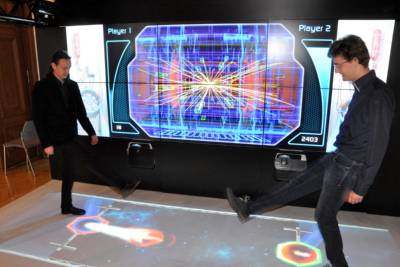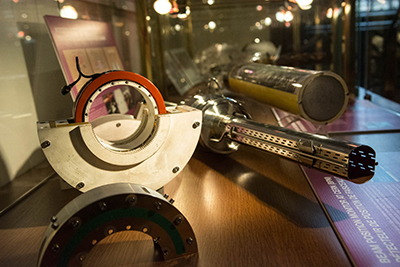Unique interactive exhibition “60 Years of CERN” at the CAS
The largest international research centre for particle physics, which operates the largest accelerator in the world, the LHC – is celebrating the 60th year since its foundation this year in September. Its official name is the “European Organization for Nuclear Research”, but it came into the awareness of the public rather under the acronym CERN (from French Conseil Européen pour la recherche nucléaire). The noteworthy interactive exhibition, is open to the public at no charge at the headquarters of the CAS from 2nd to 25th September 2014, on working days from 9 a.m. to 6 p.m.
President of the CAS Prof. Jiří Drahoš opened the exhibition with a ceremonial “kick-off of
the protons” in an interactive tunnel. In his introductory speech, he noted that he sees in CERN
the prototype of all European programmes – a prototype for European cooperation upon which a number
of European projects have built. He then mentioned that the Czech scientific community played a
very important role in the construction of part of CERN and in the experimental and scientific work
there. “I am glad that this usage of Czech scientists has had publication and other responses,”
President Drahoš emphasized.
Visitors to the exhibition could look into the secretive world of elementary particles, become
acquainted with the most important discoveries and also with the history and present situation of
CERN. In the unique multimedia area, everyone will be able to experience for himself/herself the
collision of protons and in real time to observe the traces of cosmic rays in a cloud chamber.
Other exhibits then show some of the unique pieces of equipment developed for the accelerator.
There is also information on how Czech scientists and technicians have shared in the successes of
the laboratories at CERN or how even laypersons can become involved. The organizers offer schools
and organized groups an expert commentary if they make a previous reservation, you can reserve a
time at the email address
krzyzankova@ssc.cas.cz
.
Singular experiences that you should not miss…
The interactive tunnel is a multimedia area which thanks to its sophisticated sensors
and projection in more dimensions can pull you directly into the centre of the LHC accelerator,
where you can initiate proton collisions, follow your movement in the Higgs field or walk through a
virtual CERN.
The cloud chamber of Gymnasium Opatov is a unique project in which students themselves
designed and built continuously functioning Wilson cloud chamber, with the help of which you will
see in real-time traces of cosmic rays, which constantly bombards our universe
.
You can see with you own eyes in the
collection of accelerators and detectors the unique technology used in the construction of
some of the most complex machines ever built by humanity
.
V
ideo projections will introduce you to the basic principles of the functioning of
accelerators and detectors or the possibilities of living and working at CERN
.
You can read on
large posters the basic information on the history and present situation of CERN, the
emergence and functioning of space, the Czech share of the work in this breath-taking research, and
under what conditions you yourself can work at CERN
.
Thanks to an
expert interpretation of any part of the exposition, you can find out even more. The
interpretation is prepared for every Tuesday from 2 p.m. to 5 p.m. and for organized groups at any
time after making a reservation at the address: krzyzankova@ssc.cas.cz.
On CERN
CERN, officially the European Organization for Nuclear Research, with the extent and
importance of its activities far surpasses the initial ideas of its founders six years ago. CERN
emerged on the soil of UNESCO as the first truly pan-European intergovernmental organization, whose
main aim is versatile research of the fundamental laws of the microworld, but that has already for
a long time been a source of modern technology, which has significantly influenced all of society.
CERN is the world’s most important elementary particle physics laboratory, which operates the
world's largest accelerator LHC, but conducts in it also research in other fields such as
astrophysics and climatology. Much attention is also devoted to the use of knowledge and
technologies developed for microworld research in medicine.
CERN currently has 21 regular members, and there are many other forms of cooperation. In 2010,
the CERN Council with regard to the increasing internationalization of science and research took
the crucial decision to open membership in CERN to all countries of the world, regardless of
geographic location. Israel became the first non-European member of the CERN in 2014.
Cooperation of the CR with CERN
The Czech Republic became a regular member of CERN shortly after its creation in 1993, when
Czechoslovakia had been accepted in CERN the year before. Individuals and groups had cooperated
with CERN already from the 1960s, but the decisive change did not come until after November 1989,
when the community of Czech elementary particle physicists decided to try to join CERN as quickly
as possible. One important circumstance for the success of these efforts was our participation in
DELPHI, one of the four major experiments at CERN. The Czech Republic is involved in a wide range
of experiments and projects, of R&D, using the unique infrastructure of the accelerators at
CERN, but the main ones currently are the ATLAS and ALICE experiments at the LHC accelerator. A
number of Academy institutes and higher education institutes are involved in the research at CERN
and several businesses also participate in it. For the Czech Republic, membership in CERN is
important not only in terms of participation in top experiments, but also in that it provides young
scientists and engineers with an invaluable opportunity to expand their knowledge and skills, which
can then be applied at home. Membership in CERN also gives us access to technologies developed at
CERN and opens the possibility to Czech companies to bid for important contracts, which CERN
announces each year.
For more information, contact:
Ing. Tomáš Kubeš, Institute of Physics of the CAS, tel.: +420 603 737 333, e-mail:
kubes@fzu.cz

















